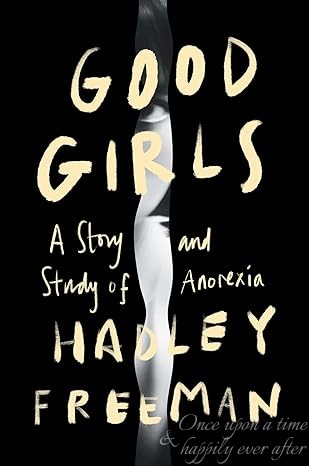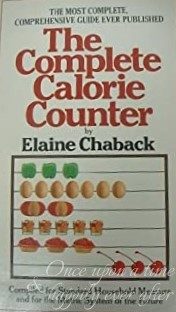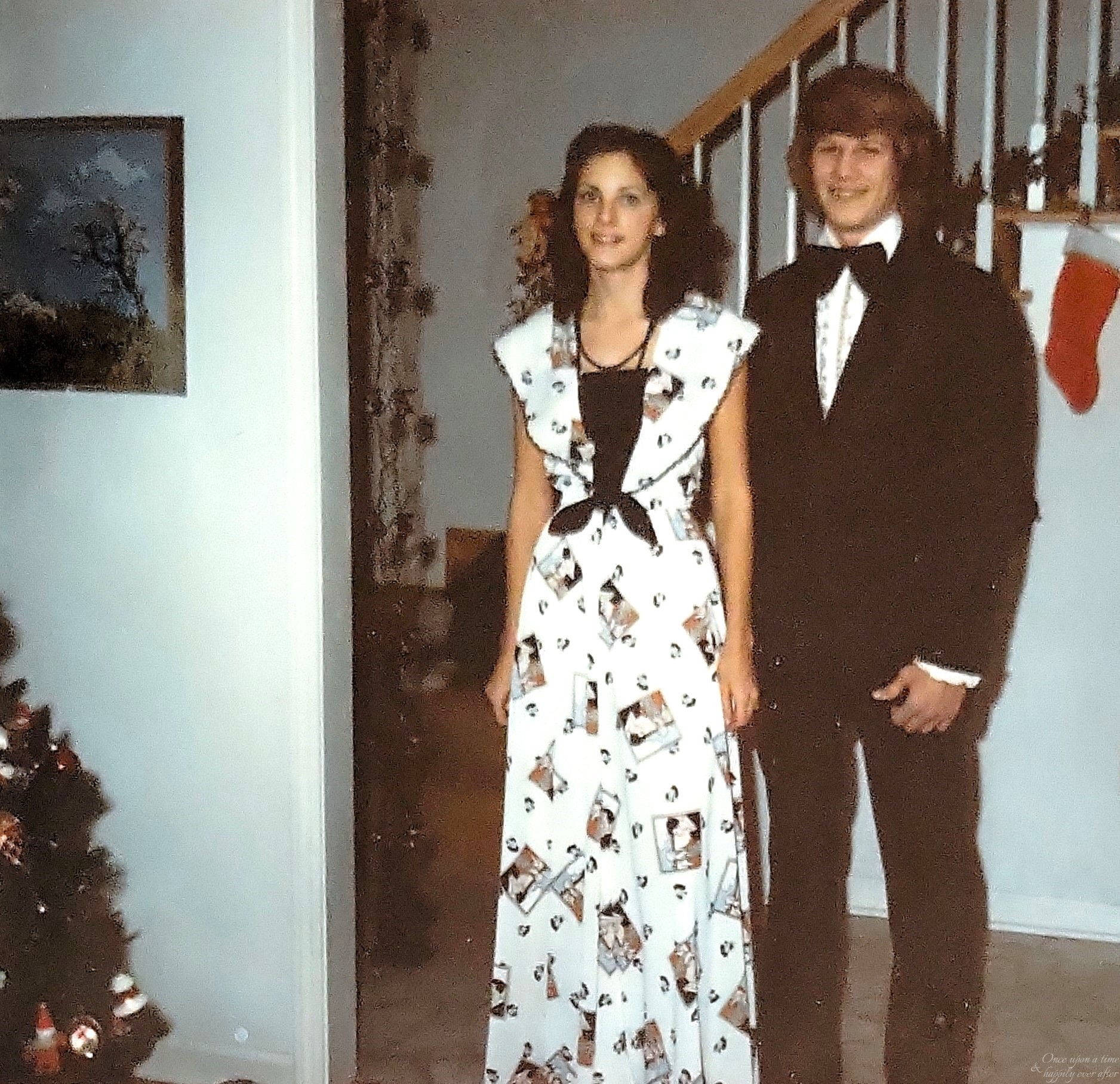Sweet readers, thank you for joining me for another edition of Title Talk. This month, I am going to share just one book I’ve read recently, Good Girls: a Study and Story of Anorexia by Hadley Freeman. My initial thought was that this book and likewise, my review post are probably not for everyone because not everyone has battled an eating disorder. But statistics about eating disorders would indicate otherwise.
Worldwide, up to 70 million people have an eating disorder. This includes 5.5 million people from America, nearly 3 million people from the UK and more than 900,000 people from Australia have an eating disorder.
[source]
Apparently, there are a lot of people globally struggling with eating disorders. So, this book might be of interest to more of my readers and friends, than I originally thought.
In selecting books for the consideration list for my online book club, Come Read With Me, earlier in the summer, I came across the book Good Girls: a Study and Story of Anorexia by Hadley Freeman, listed as a new release on Goodreads. At the end of each month, I send book club members summaries for 8 books that we will vote from to select our next read in the coming month. Most of the titles are fiction on each month’s list but I try to select a new nonfiction title and a biography, autobiography or memoir, too. Little did I know that this book would help me finally understand some of what caused my own eating disorder as a teenager.
Just a reminder: Once Upon a Time & Happily Ever After occasionally uses affiliate links which are usually italicized. If you click or make a purchase from an italicized link provided I may receive a very small commission at no cost to you. Thank you for your support.
Please find the places and posts where I link-up on this page.
Title Talk 10.2023
Good Girls was of interest to me because I was anorexic my senior year of high school and freshman year of college. So, I knew I would read it whether it was selected to be read by the group. Several years earlier, the group had voted to read a fiction book about twin sisters with body image and eating disorder issues, Thin Girls by Diana Clarke. It had inspired a lot of discussion among the book club members on our Facebook page. The group selected another title to read the month that Good Girls was on our list, but I started reading it immediately.
Good Girls: A Study and Story of Anorexia

This book does an excellent job of combining the author’s reflections from a 3-year period of time when she was a young girl suffering from eating disorders with current research in the study of anorexia. And for the first time in my life, I have a better understanding of my own experiences and struggles with this mental health issue.
Connections
Early in the book, the author makes the case for a connection between eating disorders and a number of disorders and syndromes. Obsessive-compulsive disorder (OCD), autism spectrum disorder (ASD), anxiety and perfectionism. For myself, I can say check ✅, check ✅, check ✅ and check ✅. I’ve never been been identified to be on the ‘spectrum’ but have often wondered if I might be. OCD, anxiety and perfectionism – yes, yes, yes.
“Clinical observation has long suggested a link between personality and eating disorders. Research has consistently linked anorexia (particularly when the patient does not also have bulimic symptoms) to personality traits such as introversion, conformity, perfectionism, rigidity, and obsessive-compulsive features,” Drew Westen and Jennifer Harnden-Fischer write in the American Journal of Psychiatry, as if reading off a checklist description of me.
Freeman, Hadley. Good Girls: A Story and Study of Anorexia (p. 42). Simon & Schuster. Kindle Edition.
That could be a checklist description of me, too. And I was anorexic but not bulimic. Another check mark ✅.
Hadley Freeman was hospitalized for anorexia 3 or 4 times in her young life. In writing this book, she tracked down some of the girls and women who were in treatment with her. She also shares their experiences with this eating disorder and how their stories and lives played out. And so much of what she writes could be my story, too.
Triggers
Before my book club and I read Thin Girls, I was alerted to the possibility of triggers in the fictional story of sisters Lily and Rose. As I read the book I was reminded of feelings and experiences I had shoved down deep and forgotten. I didn’t find a similar warning with Good Girls. Maybe because the book is a nonfiction. But it triggered the memories of that short period of my life much more so. Freeman talks about how much she exercised ✅, how often a single apple might be all she ate all day ✅, losing her hair ✅, and her menstrual periods ✅, being cold – so cold ✅. How she became so preoccupied with the food others were eating ✅ and preparing food for others to eat ✅.
I remembered my bedtime exercise routine conducted before my full-length mirror. The way I began running and would run no matter the weather, every day after school. How I would often have a packet of instant oatmeal for breakfast adding more and more hot water to the bowl until I was actually ‘drinking’ oatmeal-flavored water and not eating cereal at all. I began baking all kinds of goodies for my family, never tasting any of it. And supervising the way my mother prepared our evening meals. I carried a little pocketbook sized calorie counter until I memorized the calorie counts for the very few things I would eat.

[source]
Causes
I was anorexic in the ’70s. Before people really knew what anorexia was. Certainly before the causes for the disorder had been determined. And even now, the causes aren’t completely understood.
At the beginning of chapter 2, Freeman outlines “an incomplete list of reasons doctors, therapists and outsiders have given over the years for why I became anorexic.” Of her list, these are the reasons with which I could identify.
- I was the firstborn ✅
- My mother worked before I was born ✅
- My father worked too much ✅
- My parents were too strict ✅
- My parents cared too much about my academic achievements ✅
- I was too close in age to my sister ✅
- I went to private schools I went to an all-girls school (my parents wanted to send me to a private all-girls school) ✅
- I did ballet as a child ✅
- I had an imbalance in the part of my brain that regulates mood (probably) ✅
- I had an imbalance in the part of my brain that regulates self-perception (probably) ✅
- I was exposed to toxins as a baby (mom took DES before she became pregnant with me) ✅
- I was on the autism spectrum (we didn’t know anything about autism) ✅
- I was painfully immature ✅
- I am Jewish (I wanted to be Jewish) ✅
- I had inherited trauma from the Holocaust (because I was sure I was there in another life) ✅
- I felt survivor’s guilt about the Holocaust (see above) ✅
- I wanted to disappear ✅
- I was bullied ✅
- I had mother issues ✅
- I had father issues ✅
- I wanted to stay a child ✅
- I was just going through a phase ✅
- I was a darling I was a demon I was a lamb✅✅✅
At the time that I was battling this mental illness, the most accepted cause of anorexia was having a very domineering and controlling mother✅. Which was to what I attributed my eating disorder for years. My mother was very, very intelligent. She was a chemist when most women were moms. And teachers. Or nurses. She was a talented musician, made straight-As in school, graduated magna cum laude.
But her weight was one area where she struggled.
Triggers and Causes
For years, I associated becoming anorexic with several things. An unkind comment a friend of my mother’s made about my weight the summer before my senior year of high school…I was 5’6″ and 124 pounds. My somewhat controlling parents, especially my mom. And it didn’t hurt that my BFF and I began dieting together.
This picture was taken in 12.1974 after I had been dieting for about 3 months. My mom made this 2-piece dress for the Snowflake Ball. When she kept having to take up the waist of the skirt, she began to wonder what was going on.
But Hadley Freeman helped me to understand there was much more behind my eating disorder.
“The hormonal changes in puberty have a role in triggering anorexia, but it’s not that the hormones suddenly switch on and you develop an eating disorder,” says Dr. Dasha Nicholls. “There are intervening mechanisms in the process. The social and emotional challenges of adolescence are also factors. Even emotionally intelligent kids find adolescence confusing because the subtleties and nastiness of adolescent interaction are a minefield, and if you struggle to understand what’s going on socially, you’ll become unstuck. The other big issue is the changing body shape that comes in adolescence and the fear that stems from that.”
In a survey of a thousand anorexic patients at St. George’s Hospital, Professor Lacey says, “Not one had started the illness after eighteen, so it is an adolescent condition. It might not have become a problem until later, but it definitely kicked off then.” Several doctors I spoke to suggested that perhaps one reason anorexia is being diagnosed in increasingly younger girls is because puberty is starting for girls at an increasingly younger age.
Freeman, Hadley. Good Girls: A Story and Study of Anorexia (p. 48). Simon & Schuster. Kindle Edition.
The Last Chapter
As I read the last chapter of the book, I developed more insight into my own illness than I have ever had before. I had borrowed Good Girls from the public library but decided I needed to purchase the book for myself. Wanted to have the book to consult again in the future. And in writing this review, I have consulted my Kindle copy several times.
In the last chapter, Freeman talks about the fear of growing up that many girls with eating disorders experience. She explains that growing up equates to increasingly more independence and freedom. But for someone like me, who didn’t want independence and freedom, growing up is unwelcome and terrifying. The author writes:
I’ve thought a lot over the decades about why so many girls still struggle with becoming women and why they still get such terrible messages about what girlhood and womanhood mean. We can’t always change the world, and we can’t shield girls from every potential influence. But we can equip them with tools to deal with the world as it is.
I wish we were better at explaining to girls what growing up involves: not just bras and bleeding but all the things we say good little girls don’t do. It means getting bigger, hungrier, smellier, sweatier, greasier, spottier, hornier, angrier, and everyone goes through it, even if they don’t look like it, and it passes, and life gets better. I wish we would tell them that they don’t need to be perfect, and that means sometimes they will let people down, even their parents, and that’s okay, and they will experience rejection, loneliness, loss, disappointment, injustice, pain, and that, too, is normal, and it is not shameful.
Freeman, Hadley. Good Girls: A Story and Study of Anorexia (p. 257). Simon & Schuster. Kindle Edition.
I Don’t Want to Grow Up
When I read those words, the likely reason behind my own eating disorder became clear.
I was a little girl who didn’t want to give up playing with Barbies. A little girl who was not at all excited about wearing her first bra or getting her first period. In fact, as my body began developing, I wore a blue faux fur winter coat to hide my body, all day and all night up until bedtime when I could hide under the covers. ‘Dieting’ enabled me to stifle the changes puberty was bringing to my body. Without calculating it, or planning it, or even knowing what I was doing, through dieting my breasts disappeared, my periods ceased, and time stopped.
It’s about trying to say something without having to speak; it’s about fear of sexualization and fear of womanhood; it’s about sadness and anger and the belief you’re not allowed to be sad and angry.
Freeman, Hadley. Good Girls: A Story and Study of Anorexia (p. 7). Simon & Schuster. Kindle Edition.
Happier Days
Hadley Freeman had a happy ending to her struggles with anorexia. Thankfully, so did I. But we are the lucky ones.
Only 46% of people who have anorexia nervosa achieve full recovery, and 20% face lifelong health challenges and remain chronically ill due to the disorder.
[source]
I have to admit that not a day goes by that I don’t think about my weight. And about exercising. Getting steps. Running, walking, swimming, biking. My Weight Watchers points. How tight (or loose) my jeans feel. My double chin. On and on. But I am not anorexic anymore. And for that I am thankful.
If you or someone you know might have an eating disorder, seek help. Talk to someone. A trusted adult, friend or medical professional.
The Alliance for Eating Disorders Awareness Helpline offers support and resources for individuals dealing with eating disorders. Whether someone is struggling with anorexia, bulimia, binge eating disorder, or body image issues, the helpline is there to provide compassionate assistance on the journey towards recovery and healing. [source]
- Phone: 1-866-662-1235
- Website: https://www.allianceforeatingdisorders.com/
Your Turn
Read anything good lately? If so, please share in a comment below. My book club just voted to read The Last List of Mabel Beaumont by Laura Pearson. As a veteran list-maker, I was hooked just reading the title. And the first chapter did not disappoint.
Joining all the girls for the “What’s on Your Bookshelf?” this month: Deb from Deb’s World, Sue from Women Living Well After 50, Donna from Retirement Reflections and Jo from And Anyways. But as per my usual, coming in fashionably late with my post.
Also hoping to join my friend Kym who blogs at A Fresh Cup of Coffee and Just a Second: Book Review Bulletin, if I can ever get this post finished!!
This was a hard post to write. Whew. Glad it is done. Time for a quesadilla and a Margarita at Boozy Tacos. Wishing you a delightful weekend.
Hugs and kisses,



Leslie, I am humbled you would share so much of your story with us. My best friend growing up developed anorexia in her late 20s, early 30s. She would run and run. Every time I saw her she was smaller and smaller. Her father-in-law was a doctor and told her she was going to die before him if she kept it up. She said that was what helped her see the problem. I don’t know if that’s true or not. I also think part of what goes into the whole dieting mentality (maybe anorexia, maybe not) is the emphasis our mothers put on our weight. My mom was always after my older sister to lose weight. Consequently, we didn’t have many starchy meals or desserts at our house. I think Mom, inadvertently, created this idea of good foods vs bad foods for both my sister and me. I didn’t have a weight problem until after getting married. Then, I sought comfort in food. I’m still an emotional eater to this day.
Thanks again, my friend!
https://marshainthemiddle.com/
Oh boy, just reading this post is a trigger. I am sorry you had to battle and work to overcome this. I can also relate and it makes me sad that the statistics are so high, especially as a mom of girls. It’s interesting how same families and upbringing can still result in different ways of relating and viewing food and bodies. It happened in my family and I can see it happening to my girls. I just hope that with us being so much more aware, honest and open to help earlier may help many young women with a little less destruction in their lives. I don’t think I am at a place to read this book at the moment but I enjoyed you making me aware of it.
bosbodaciousblog.blogspot.ca
Hi Leslie, this was an honest, engaging and thought provoking post and for that I say thank you! I can’t say I have ever had an eating disorder but I realise I probably sailed close to the wind when I was younger. What a great review you’ve written and sharing your story so eloquently as well!
Thanks for joining us for #WOYBS and I wish you well x
Thank you for posting this review. I know I’ve suffered with disordered eating patterns forever and (for a time) eating disorders, but have never sought help or disclosed the issues. As more people in adulthood are being diagnosed with ADHD and other issues the discussion regarding eating disorders and their prevalence will follow. Girls, as you know, are extremely good at masking and the numbers, as a result, are substantially lower than the reality.
You are so right. No one realized what I was doing until I had lost probably 20 pounds. And I got sick and had to go to the doctor. My mom flipped and so did the doctor when she lifted my shirt to listen to my chest and realized how thin I was. Thank you for sharing a bit about your struggles. A day doesn’t go by that I don’t think about eating, exercising, how tight my clothes feel, calories, Weight Watchers points. It is no wonder I am distracted!!